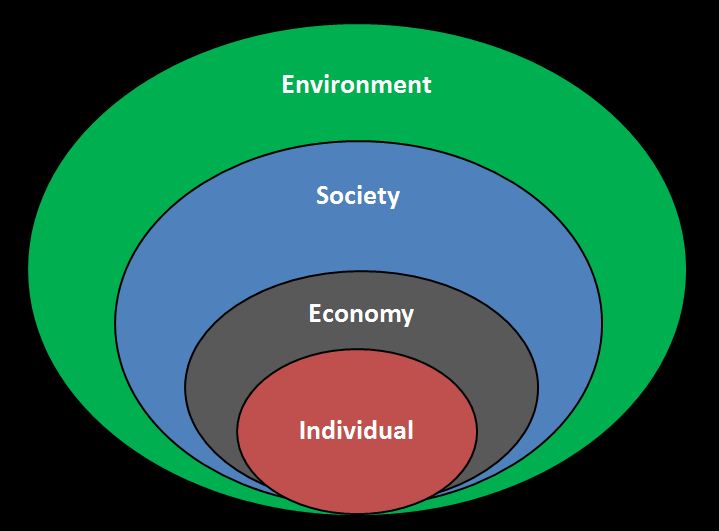
Understand your impact
Ecological Footprints
Around the world, people are confronting the need to integrate more environmentally sustainable habits into their lifestyles. For those of us who are embedded in an economic infrastructure of excess consumption, pollution, and waste it is of particular importance to understand the environmental implications of our lifestyle choices. The various footprint measures discussed and collected here are ecological accounting tools designed to accomplish this task.
Conventional markets do not capture our impact on the environment.
Just as the cost of a food item does not allow one to infer it's nutritional or caloric content, price tags around the world do not reflect the environmental impacts associated with the respective product or service. With hundreds of transnational corporations and billions of people engaging in economic decisions daily this failing of conventional markets to capture environmental impact has become a key challenge to the development of a sustainable global society.
The Tragedy of the Commons
The failure of the current global economy to embody ecological constraints in its market values implies that corporations and individuals that rely solely on financial costs to guide their economic activity will not only, not take the environmental consequences associated with their activities into account, but that they actually have a economic incentive not to do so. Commercial enterprises that use dwindling natural resources (such as fish, oil, or water) are facing market incentives to discover, extract, and use those resources as quickly as possible rather than engage in sustainable resource development and management and possibly lose the resource to a potential competitor. This arrangement drives a scarcity, extraction, and depletion dynamic to the detriment of all. The implications of an economic system which rewards mass consumption of common goods and resources at unsustainable rates is known generally as "The Tragedy of the Commons"1. Examples of SED dynamics and the Tragedy of the Commons can be seen in reductions of global air quality due to world-wide combustion reactions 2, diminishing water resources 3, and the fact that since 1950 big ocean fish stocks have fallen by 90% 4. Sustainable use of natural resources requires that humanity take the needs of other organisms and natural services into account when making decisions.
Ecological Resource Accounting
| "Nature shrinks as capital grows. The growth of the market cannot solve the very crisis it creates." | |
| Vandana Shiva, Indian physicist and environmentalist (1952-) |

|
Ecological, water, and carbon footprints are resource accounting attempts to estimate the environmental impact of various goods and services. The water footprint allows for a given service, product, or decision to be evaluated based on its impact on water resources in addition to its economic cost. Carbon footprints estimate the amount of energy and CO2 emissions involved in a service or product. Ecological footprints are an aggregate measure of environmental impact measured in terms of the land area necessary to provide the natural resources used in the transaction. Use the menu at the left to read more about each of these or the icon above this paragraph, to find your personal or family footprints, and begin taking steps to a more sustainable lifestyle!
References
1. Hardin, G. The Tragedy of the Commons. Science, Vol 162, no 3859 pp 1243-1248; Dec 1968.
2. USGCRP (2009). Global Climate Change Impacts in the United States . Thomas R. Karl, Jerry M. Melillo, and Thomas C. Peterson (eds.). United States Global Change Research Program. Cambridge University Press, New York, NY, USA.
3. Water Scarcity, Extraction, Depleation Dynamic Examples. Science for the People. 2011
4. Big-Fish Stocks Fall 90 Percent Since 1950, Study Says; May 15, 2003. National Geographic News